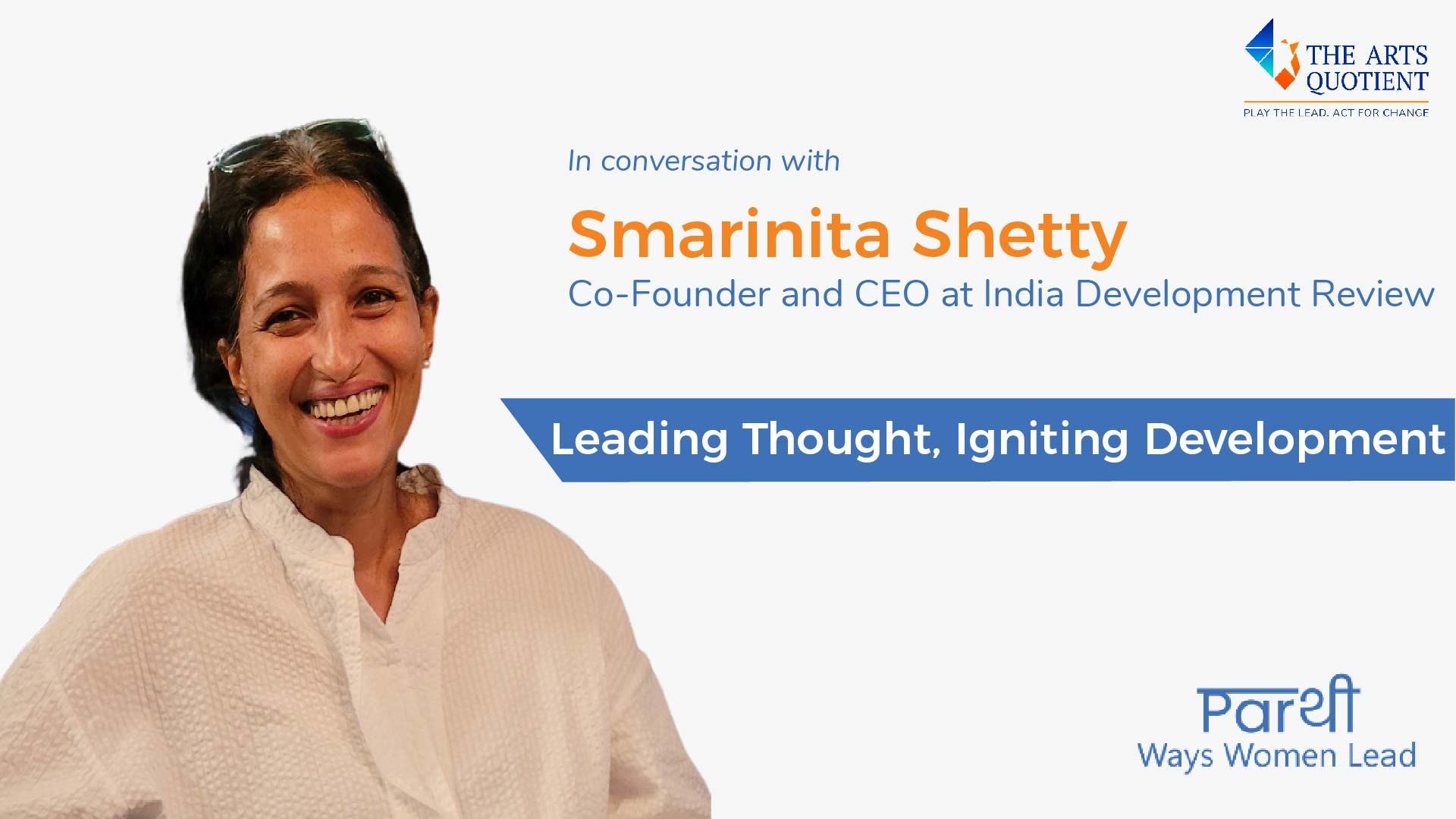India Development Review (IDR) is India’s first independent media platform for the development community that publishes fact-based cutting-edge ideas, lessons, and insights in mainstream media. Smarinita Shetty is co-founder and CEO of IDR and has been leading IDR for more than 5 years.
Smarinita shares her experience of transitioning between a variety of different work environments, how gender impacted her work and how she managed to maintain work-life balance, while building an institution with a purpose.
Crafting a vision: The birth of India Development Review
Beginning as a journalist, Smarinita’s career wove through several roles including co-founding a start-up (Netscribes), an investment banking job at JP Morgan, a couple of volunteering stints at Magic Bus, several years at Monitor doing market-making for social businesses and then working with Dasra. She talks about developing an interest through all of this in creating a space for learning in the social sector, where sharing information is the priority; and how that idea took the form of the India Development Review
“I think during my time at Dasra, and also, at Monitor, this idea came to me about what is today IDR. There was no place to learn in the sector. For instance, if I needed to know anything, I had to find somebody who knew something about the topic. I couldn’t go anywhere to learn, except for the Stanford Social Innovation Review, which is this publication based out of Stanford, but which had a very western context, very western worldview. I’d gone to the field and met a lot of organizations, but I didn’t hear their perspectives in the rooms I was in. And I definitely wasn’t able to read about any of it anywhere.

I started talking to a few people in the sector about it. And everybody agreed that there was a gap. So I asked Rachita, who used to work with me at Dasra, if she would like to join as a co-founder and then I asked Devanshi. And when they both said yes, IDR happened. We spoke to a lot of people around 100 people before we started saying we think this is the model, and we think this is what it should be like.”
" I think our vision was very clear saying that we want to democratize access to information because we really think that knowledge is power."
" I think our vision was very clear saying that we want to democratize access to information because we really think that knowledge is power."
“Today, knowledge is owned by people who sit in the metros, who are English speaking, belong to the large non-profits and foundations. And it impacts who gets the money, who gets the opportunities to partner, who gets in front of government. And we said, if we could democratize access to information, if knowledge was made available to everyone, then maybe it will be a little more level playing field. The smaller NGOs would know who’s out there, they would understand what interesting practices are there, they would know the names of donors, and how they were thinking. And that hasn’t changed. It still is about how do we get relevant, useful, actionable information to the people who need it in the sector.

I think I’d just be happy if IDR survived and became an institution – if it had a life of its own, it would continue to serve the purpose that we set it up with – which is how can you make knowledge available to all? Can people of all types, and backgrounds and lived experiences contribute? And can that that knowledge be made available to whoever wants it? And that they find it useful? So I think if IDR can continue to do that without me, I’ll be happy.
Because right now, it’s literally like, after 3 years, will we have money?After five years, will we have money? Can it be an institution, where it’s just taken for granted that it will be there like the funding will happen, talent will be there and, there will always be good quality and useful learnings that we put out there. That we will always try and do right. So, it would be nice if that happens.”
Navigating challenges and establishing a Brand
IDR operates in a space beyond boundaries which can be as challenging as inspiring. Not being an organization with a clear-cut focus area such as livelihoods or health or children, Smarinita shares her story of navigating roadblocks, crafting a strong identity for IDR and establishing a brand.
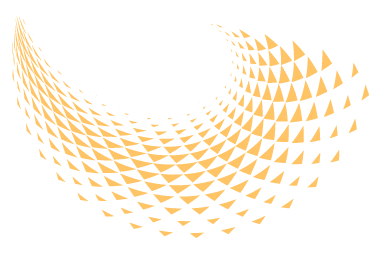
“I think we had trouble fundraising initially, we still kind of do, because we are not an implementing organization. We are what people call an intermediary. And a lot of funders want to fund education, and livelihoods and projects on the ground. We had done our research. But we said, if we want credibility, and if we need funders — who are largely men to pay attention to us, we need a stamp. So we went to Ashoka University. And we said, we want to partner (with your Centre for Social Impact and Philanthropy — CSIP). And I think because we did that Ashish Dhawan funded us. Because he is an Ashoka founder (and chairperson, and had conceptualised CSIP). He said, ‘Okay, this makes sense — they will do the research and you can disseminate it. And I like your model’. And once he funded us, it was easier for us to go to the others, and ask for money.
I never thought of it as influence (with funders). I think of it as saying, I’m going to tell you what our vision is. And then hopefully, if it aligns with how you’re thinking about the sector, or what needs to be done, whether you’re a funder, or whether you’re a non-profit, whether you’re another partner. Then maybe we can figure out a way to work together. I really don’t think I’ve been able to influence people, I think I managed to find people who think like we do. And that’s where those conversations have worked out for us.
There are so many people we’ve gone to and they said, “No” it doesn’t fit into our things” . So, we found newer people. And I think the ones who funded us we’ve gone back to them, but we’ve also gone back to the ones who have said, “No” and we are hoping that over time, maybe, something will change in how they are thinking, and they might find us relevant or aligned at that point of time. And but because the universe (of who will fund entities like us) is so limited, going back even to the ones who said no, is important. So, a large domestic foundation, has been telling us no since forever, but every year I go back to them and say, oh, you know, we’re doing something different, or we’re doing something interesting now. You might not want to fund the institution. But would you fund maybe certain things and certain projects
It’s a matter of survival. It comes from a place of fear that if I don’t do this, IDR will shut shop. I’d be really happy if there was money available, or someone else did it. But I run on this constant thing that, if you don’t have money, we can’t run IDR. That is a big propelling force.”
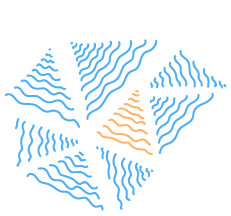
“I think people take us seriously because of who writes for IDR. We said that we want to make sure that everyone has a voice and we will go and find the people who are under-represented and underserved. But we were also very intentional about getting some of the big names in the first year. You had like, Vijay Mahajan, or Rohini Nilekani… then people were like, Oh, we know if Vijay or Rohini think IDR is a good enough place to write then we should take them seriously.
So we built that by pulling in people who were already well respected, who already had stature in the sector. And they were really generous. We built it on the backs of our contributors. And we had some really good contributors. Some of them were well-known, some of them were not. But the ones who weren’t well known, wrote really good stuff, and what they put out there was really insightful.”
" We didn't intentionally invest in building our profile and stuff. But I think it's the kind of content we've carried that has built a brand "
" We didn't intentionally invest in building our profile and stuff. But I think it's the kind of content we've carried that has built a brand "
Gender at work
Over the course of her career, Smarinita had the opportunity to work in environments where there were mostly men, and therefore had a more masculine flavour as she sees it; and also, environments carrying more feminine energy, with majority women around. She shares her observations on the differences she sees and what worked for her in a more feminine culture.
“My second job in my career was in mutual funds. Amongst the 12 guys there, I was the only woman salesperson. And I didn’t enjoy that at all because it was it was like this very bro culture. A lot of the work that we did, they did over drinks, over dinners. And then again, at JP Morgan, it was the same thing — out of the six VPs, I was the only woman. And I didn’t enjoy it. I think I’ve thrived in environments where they’re small; I need camaraderie, where people are nice, in addition to, being smart.
I don’t want to generalize, but I think there is less talk and more work, in women-led spaces. There is also more space for listening….at least, what we’ve seen it IDR and even at Monitor (Inclusive Markets) where we had women in senior positions; where it was an equal mix, it was just a much more open environment, where people were listening, where it wasn’t prescriptive, it wasn’t hierarchical. It’s a way of working, a way of carrying a team with you — that is a female thing.”
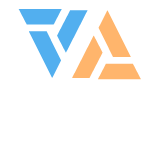
“I think it also makes a difference how men carry themselves when there are more women around. Just like when you’re a minority — if you’re a woman and you’re surrounded by men, you kind of become more masculine in how you behave; you adopt their traits if you are one or two amongst 10 men. I think the same applies when it’s the other way around. You kind of adopt or mirror some of the traits that you see if you’re two or three men in women majority environments.
I don’t know, maybe it’s me, but my closest people — that I pick up the phone and talk to in the sector are other women. And it helps to know that there are people you can call for advice, who will genuinely help you, who will address your small queries and your big kind of things.
Sometimes you just need a space to vent. You need your peers who have the same problems, are facing the same set of issues. We all face issues, whether it’s around talent, or funding or processes…just to be able to pick up the phone and talk– that’s a big deal. It’s like a repository of wisdom, knowledge, but also tactical information. Plus, having a bunch of friends where you can talk shop. It’s a very important aspect of being able to survive the day to day of working.
I think young boys are encouraged in a sense if you decide to be CEO tomorrow, you will be given all the opportunities to make that. The world is your oyster. Whereas with a young girl, you don’t know – the future is far too uncertain. What is going to happen? Will you get married to someone who gets transferred, will you have kids who might need a lot of work and time then will you have to change your mind about what you want to do then? I think, we internalize all these uncertainties very early on in life. For men, it’s like I just have to work, I just have to go and become a CEO everything else, my family and all will fall in place. Whereas with women, I think all those factors play a part.”
Staying energized, continuous learning, and advice to young women leaders
Being a woman at work, with many priorities to juggle regularly, Smarinita shares her insights about ways to stay energized and get in the right mind-set to keep learning. She also offers her observations about a few things that women aspiring to leadership need to think about
“The one thing we women give up is ‘me time’. There is no concept of ‘me time’, I mean, you’re either doing stuff for your children, you’re doing stuff in the house, or you’re doing office related/ professional work. I think when my kids were younger, I found it much easier. Because they’d go to school; I came back from work, they would go down to play and you found some time. I didn’t carry too much guilt. I feel that guilt now. My older son is 14, and studies have become an important part of his life. I feel like I have to constantly be there — I have to keep saying please study. Have you done this? Have you done that? Have you done your homework? And I don’t particularly enjoy it. I feel the strain a lot more. Again, because now I think it’s both like a start-up as well as my kids are at that age where I feel they need more attention.
The scales between work and home are not balanced. They’re usually tipping, one end or the other. And I really don’t know how to solve for it. I didn’t have this problem 3-4 years ago. It’s happening now. It’s happening when my kids are older.”
“I’m an early morning person. I wake up at 4:30 every morning, and that’s the time I actually get to myself, and when I end up doing IDR related work. It’s still quiet, the household is quiet. I do my best work before the family gets up at 6:30. So, that kind of doubles up as my me time and time to do the serious thinking as well as writing work.
When I used to take my son for his athletic training at 4 am pre-Covid (he was a state level athlete), I would walk on the Juhu beach. Walking really helped and I would do my thinking there. I walk in the mornings three to four times a week. I have started listening to podcasts. I think our job — because of the way IDR is — a lot of our work is watching, listening and reading stuff. And it feels as if we’re always a little behind. Because we need to know what’s happening in the world. And there’s always there’s so much information overload that sometimes it can get overwhelming.
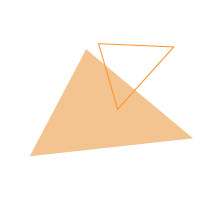
But in terms of rituals I’m very particular I need to wake up atleast one hour before the rest of the household. Just for me to feel in control of the day. When I’ve taken breaks at work, I’ve done different stuff. I’ve usually taken the six months of between jobs where I’ve gone and learned pottery or learned to play tennis and things like that. I got lucky because I worked in mutual funds. I tell this to a lot of other younger women – please save. Please save and invest, because that’s what allowed me to do this six-month break thing. I could afford to take breaks in life, because I had the money to be able to do it.
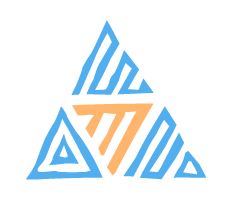
What worked out for me, in a sense, is saying that, okay, let’s see where it goes. Every job I’ve taken I had not known anything about it. When I went from journalism to a mutual fund. I didn’t know anything. I got hired by that CEO of the Mutual Fund, because he figured I understood interest rates, and maybe might be able to explain debt to companies. But at 25 years, I didn’t know how funds worked, and I didn’t know anything about the stock markets. I didn’t know anything about investment banking when I joined JP Morgan. And even when I went to Monitor, they were doing affordable housing. I knew nothing. I didn’t know how to calculate square feet and square meters. But I was like, what’s the worst case? If it doesn’t work out, I’ll find another job.
I don’t know what it was. When I hire women at IDR, I’ve had to spend so much time convincing them saying that you will learn, you have it in you. You have the smarts, you have the ability, it is just a matter of learning a particular subject, and I think women hold themselves back a great deal.
Which is why if you have enough money, you can say that okay, if it doesn’t work out, I still have enough money in the bank to take two months to find another job. It is unusual for women to think like this most women will be like, I have to be fully qualified for the job, only then will I put my hand up for it.
" I think we deprive ourselves of things that we would shine in because we don't know what it looks like."
" I think we deprive ourselves of things that we would shine in because we don't know what it looks like."
I think it’s the thing about being a perfectionist. I see it with a lot of the young women I’ve worked with in the past and even at IDR. The women will do a perfect job. They will cross their T’s, dot their I’s. But, there’s only so much time in the world! Their thinking is — unless you’ve done it in a perfect way you will not take on the next thing, because you’ve gotten used to that level of perfection. When you start something new or unfamiliar, you worry that you will not be able to do it the way you want to do it. And that becomes a big barrier for what opportunities you choose.”
Covid pandemic and changing times
On the personal front, being a mother, Smarinita found remote working more preferable but as CEO of IDR, she talks about how it impacted their work culture.
“A part of me was happy that I was at home because I got full 24X7 time with my kids. I feel like I know what’s happening in their lives, I feel like more involved in things like that. I think on the professional front, I was actually very happy to not go and do meetings in Delhi, and Lucknow and Bangalore and everywhere.
But I think, at IDR we struggled, because a lot of our team’s culture and energy comes from being in-person. We are a team which would sit for lunch and talk about everything but work…you learned off each other. And also the nature of our work – every article there are at least two or three people working on it.”
" When you are together, you bounce off ideas and edits, and all of that... remotely it became much harder, because then it became like somebody is barking instructions? Like you're giving suggestions without the body language or the warmth to support it "
" When you are together, you bounce off ideas and edits, and all of that... remotely it became much harder, because then it became like somebody is barking instructions? Like you're giving suggestions without the body language or the warmth to support it "
“We onboarded a lot of people during the pandemic. I think the ones who did well, were the ones who were in our office before the pandemic, because there was a rapport that was already there. But trying to build that culture – which is so important for us — it has been hard. So now, at least over the last six months, we’ve done a couple of offsites. We are saying, Okay, if we can’t meet like, on a day to day at least, can we meet once in three months so the team, can build some connection with each other….but it’s been hard, because also a lot of the team felt overwhelmed.
But in terms of the external world IDR seems to have done fine. We’ve continued to produce good quality work, we’ve added new features, and new things that are relevant and interesting to people.”
